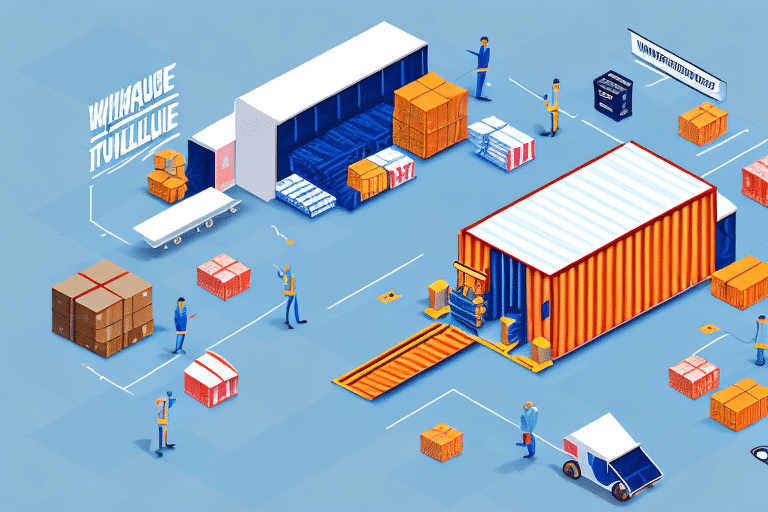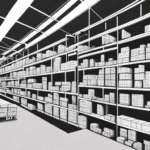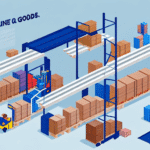Why You Should Automatically Send Orders to Your Ecommerce Store's Fulfillment Warehouse
As an ecommerce store owner, optimizing your order management process is crucial for sustaining and growing your business. Beyond managing inventory, efficient shipping operations play a vital role in customer satisfaction and overall success. Handling a high volume of orders manually can lead to inaccuracies and delays, making automated order fulfillment an essential strategy. This article delves into the significance of automated order fulfillment and its myriad benefits for your ecommerce store.
Understanding the Importance of Streamlined Order Management for Ecommerce Stores
Effective order management is the backbone of a successful ecommerce store. Each incoming order must be processed swiftly and accurately, a task that becomes increasingly challenging as order volumes rise. Streamlined order management minimizes manual interventions, thereby reducing errors and saving valuable time. Implementing automated order fulfillment is a strategic way to enhance your order management workflow.
Integrating your ecommerce platform with a reliable inventory management system further streamlines your operations. This integration ensures real-time tracking of inventory levels, preventing overselling and stockouts. Automated updates of inventory as orders are processed reduce the risk of errors and delays, leading to improved customer satisfaction, increased efficiency, and higher profitability.
Advantages of Automating Order Fulfillment for Your Ecommerce Business
Automating your order fulfillment process offers numerous advantages:
- Speed: Automation accelerates the order fulfillment process, ensuring customers receive their orders promptly, which enhances customer satisfaction and encourages repeat business.
- Accuracy: Automated systems minimize errors associated with manual processing, such as incorrect shipping addresses or wrong product deliveries.
- Efficiency: Automation frees up your time, allowing you to focus on strategic aspects of your business rather than the repetitive task of fulfilling orders.
- Cost Savings: By reducing errors and streamlining operations, automation lowers costs related to returns, exchanges, and reshipments.
- Scalability: Automated systems can easily scale to handle increasing order volumes without compromising on quality or accuracy.
Furthermore, automation enhances inventory management by ensuring optimal stock levels, thereby improving cash flow and overall profitability.
How Automated Order Fulfillment Can Improve Your Customer Experience
Automated order fulfillment significantly enhances the customer experience in several ways:
- Faster Delivery: Customers receive their products more quickly, boosting their satisfaction and likelihood of returning.
- Accuracy: Precise order processing reduces the chances of mistakes, ensuring customers receive the correct products.
- Transparency: Providing tracking information increases transparency, allowing customers to monitor their orders and build trust in your brand.
- Reduced Errors: Automation minimizes the risk of lost or damaged products by handling orders with precision.
- Efficient Operations: Streamlined fulfillment processes allow your staff to focus on customer service and other value-added tasks.
These improvements not only enhance the customer experience but also strengthen your brand reputation and customer loyalty.
Choosing the Right Fulfillment Warehouse for Your Ecommerce Store
Selecting the appropriate fulfillment warehouse is critical for your ecommerce success. Consider the following factors:
- Location: Choose a warehouse strategically located to minimize shipping times and costs.
- Pricing: Evaluate the cost structure to ensure it aligns with your budget and offers value for services provided.
- Services Offered: Ensure the warehouse provides comprehensive services such as pick-and-pack, shipping, and returns management.
- Reputation: Opt for a fulfillment partner with a solid reputation and positive reviews from other ecommerce store owners.
- Technology Integration: The warehouse should seamlessly integrate with your ecommerce platform, offering real-time inventory updates to prevent overselling.
- Customer Service: Reliable customer support is essential for addressing any issues promptly. Look for warehouses that provide dedicated account managers or responsive support teams.
Choosing the right fulfillment partner ensures efficient operations, enhances customer satisfaction, and supports your business growth.
The Role of Technology in Automated Order Fulfillment for Ecommerce Businesses
Technology is the cornerstone of effective automated order fulfillment. Essential technological components include:
- Order Management System (OMS): Manages and tracks orders from placement to delivery.
- Inventory Management Software: Streamlines inventory tracking and management, ensuring accurate stock levels.
- Order Tracking Tools: Provide customers with real-time updates on their order status.
Implementing these technologies offers several benefits:
- Reduced Errors: Automation minimizes human errors, ensuring accurate and efficient order processing.
- Scalability: Technological solutions can easily scale to accommodate growing order volumes without compromising quality.
- Efficiency: Automated systems optimize workflows, reducing processing times and operational costs.
Embracing the right technology enhances your ability to manage orders effectively, scale your business, and maintain high levels of customer satisfaction.
Steps to Setting Up Automated Order Fulfillment for Your Ecommerce Store
- Choose a Fulfillment Partner: Select a fulfillment partner that aligns with your business needs and budget.
- Integrate Systems: Connect your fulfillment partner’s system with your ecommerce store using APIs or plugins to ensure seamless data flow.
- Configure Management Systems: Set up your order and inventory management systems to work harmoniously with your fulfillment partner’s technology.
- Test the System: Conduct thorough testing to ensure the automated order fulfillment system operates correctly and efficiently.
After setup, monitor the system regularly to ensure continued efficiency and address any issues promptly. Regular assessments and adjustments help maintain optimal performance and align the system with your evolving business needs.
Benefits of Outsourcing Your Order Fulfillment to a Third-Party Warehouse
Outsourcing order fulfillment to a third-party warehouse offers several strategic advantages:
- Focus on Core Business: Delegating fulfillment tasks allows you to concentrate on marketing, product development, and customer engagement.
- Cost Efficiency: Third-party warehouses often have negotiated shipping rates, reducing your overall shipping and handling costs.
- Expertise: Gain access to specialized knowledge and advanced fulfillment technologies without the need for significant in-house investment.
- Scalability: Easily scale your operations to accommodate growth without the complexities of expanding your own infrastructure.
- Flexible Storage: Benefit from adaptable storage solutions that can adjust to fluctuating inventory levels.
Outsourcing fulfillment streamlines your operations, reduces costs, and provides the flexibility needed to adapt to market demands efficiently.
Common Challenges in Automated Order Fulfillment and How to Overcome Them
While automated order fulfillment offers substantial benefits, it also presents certain challenges:
- System Integration: Integrating various systems can be complex. Partnering with a seasoned fulfillment provider can facilitate smoother integration.
- Inventory Management: Maintaining accurate inventory levels is critical. Utilizing robust inventory management software helps prevent overselling and stock discrepancies.
- Returns Handling: Managing returns efficiently requires a well-defined process. Implement clear return policies and ensure your fulfillment partner is equipped to handle returns seamlessly.
- Timely Delivery: Meeting customer expectations for fast and reliable shipping is essential. Optimize warehouse operations and collaborate with reliable shipping carriers to ensure timely deliveries.
Addressing these challenges proactively ensures that your automated order fulfillment system operates smoothly and continues to support your business objectives effectively.
Best Practices for Managing Your Inventory with Automated Order Fulfillment
Effective inventory management is vital for successful automated order fulfillment. Implement the following best practices:
- Monitor Stock Levels: Regularly track stock levels to prevent overselling and stockouts. Set reorder points to maintain optimal inventory.
- Maintain Accurate Product Information: Ensure product descriptions, images, and specifications are up-to-date to prevent fulfillment errors.
- Use Advanced Inventory Management Tools: Leverage technology to gain real-time insights into inventory status and forecast demand accurately.
- Implement Cycle Counting: Conduct regular cycle counts to verify inventory accuracy and identify discrepancies early.
By adhering to these practices, you can maintain precise inventory records, enhance order accuracy, and ensure a seamless fulfillment process that meets customer expectations.
Measuring the Success of Your Automated Order Fulfillment Strategy
Evaluating the effectiveness of your automated order fulfillment strategy is essential for continuous improvement. Key metrics to monitor include:
- Order Volume: Track the number of orders processed to assess capacity and scalability.
- Order Accuracy: Measure the rate of correct orders fulfilled to identify and reduce errors.
- Shipping Times: Monitor delivery speeds to ensure they meet customer expectations.
- Return and Exchange Rates: Analyze return rates to identify potential issues in the fulfillment process.
- Customer Feedback: Collect and review customer feedback to gain insights into the fulfillment experience.
Regularly reviewing these metrics allows you to identify strengths and areas for improvement in your fulfillment strategy. Additionally, incorporating customer feedback provides valuable perspectives that can guide enhancements to your system, ensuring your ecommerce store operates at peak efficiency and maintains high levels of customer satisfaction.
By closely monitoring performance indicators and adapting your strategies accordingly, you can ensure that your automated order fulfillment system continues to support your business growth and customer satisfaction goals effectively.




















